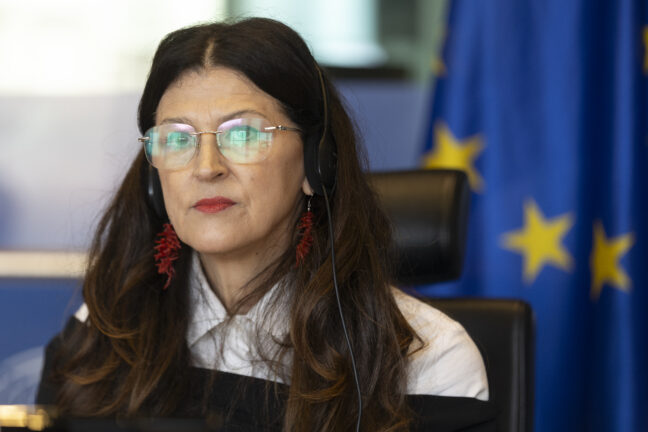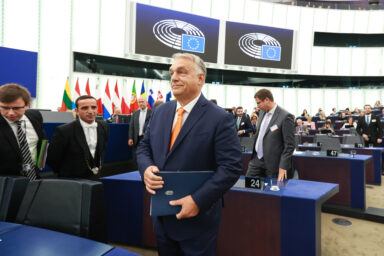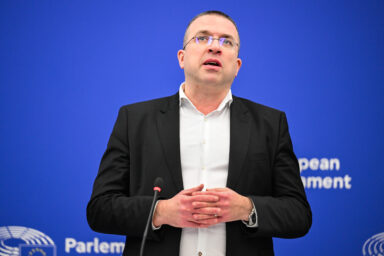Europe is facing a cancer paradox. Breakthroughs keep coming, targeted therapies, Nobel Prize-winning immunotherapies, a new wave of advanced treatments such as antibody-drug conjugates (ADCs), bispecific antibodies and CAR-T cell therapies, but patients’ chances of survival still depend on where they live. Up to 200,000 deaths a year could be avoided if outcomes matched the best-performing countries, according to a new EU-wide comparison of cancer care.
MEP Romana Jerković (S&D/HRV) made the point at the launch of the Comparator Report on Cancer in Europe 2025: “Science is not the limit. We already have the knowledge and technologies that can save lives. The challenge, the real challenge, is to ensure that these advances reach patients everywhere, regardless of where they live and regardless of the resources of their healthcare systems.”
Up to 200,000 lives could be saved each year if survival rates across Member States matched those of best performing countries. – MEP Romana Jerković
“It is unacceptable that a patient’s chances of surviving cancer in Europe still depend on the country they live in. As we know from the IHE Comparator Report on Cancer in Europe 2025, up to 200,000 lives could be saved each year if survival rates across Member States matched those of best performing countries,” MEP Jerković told EU Perspectives.
Unequal survival
The report, commissioned by EFPIA and produced by Sweden’s Institute for Health Economics (IHE), shows wide gaps. Five-year survival reaches 75 percent in Sweden but just 51 percent in Poland. Since 1995, the EMA has approved 194 cancer medicines and 318 indications. In 2023, oncology made up 29 percent of all clinical trials launched worldwide. Yet patient access remains patchy.
MEP Jerković warned that closing the gaps will require more than goodwill. “To ensure fair access and availability, we need a collective effort. It means aligning European action with national reforms, improving healthcare delivery and ensuring sustainable investment in cancer care.”
Progress, with caveats
Each year, more than 3 million Europeans are diagnosed with cancer, almost 60 percent more than in 1995. Cancer now causes nearly one in four deaths. Mortality is stabilising, and in 12 of the 31 countries reviewed by IHE the curve has already bent down. But geography still dictates survival.
IHE’s health economist Thomas Hofmarcher framed Europe’s mission in two parts: cure more patients and prevent more cancer. His vision is bold, a five-year survival rate of 100 percent.
You might be interested
Reality still depends on national systems. “In Germany, new cancer medicines are reimbursed within about 100 days, but in Latvia and Lithuania the wait can stretch to 900, while in Estonia, Lithuania and Malta almost none are reimbursed at all,” Mr Hoffmacher said.
Uptake data underline the point. In lung cancer, Central and Eastern Europe show low use of targeted medicines, Slovenia is the exception. Even among big economies, France and the UK show a twofold difference. Austria, Switzerland and France lead on adoption, while Latvia, Poland and Estonia lag behind. Disparities have narrowed from five-fold to 3.3-fold in five years, but remain large.
Money matters too. In 2023, per-capita spending on cancer medicines ranged from €31 per person in Latvia to €195 per person in Austria. Overall cancer-care spending has more than doubled since 1995, but indirect costs, lost productivity, have dropped from €97bn to €82bn. That leaves the burden per patient flat or slightly down, a nuance often missed in payer debates.
The missing data
For MEP Jerković, Europe’s blind spot is data. “Without accurate, comparable and comprehensive data, we cannot truly understand where inequalities lie, nor measure the impact of our interventions. Cancer registers and real-world evidence are vital… Data also empowers us to share best practices across the borders, so that success in one country can become the opportunity in another.”
Mr Hofmarcher echoed the concern. Half of EU countries fail to publish survival or treatment-pattern data. “Without up-to-date or real-world data, policymakers are navigating without a compass,” he said.
Budget politics
Europe has built a framework, the Beating Cancer Plan, the Cancer Mission, EU4Health, the HTA Regulation, the European Health Data Space. But the Commission’s proposal for the next Multiannual Financial Framework (MFF) leaves health without a stand-alone budget line.
Under the Commission’s proposal for the next MFF, funding for health is not envisioned as a standalone budget line. Nonetheless, I will continue to fight for sustainable EU funding for health – Romana Jerković, MEP
Ms Jerković told EU Perspectives her focus now is to secure continuity: “My priority is to ensure that the progress made under Europe’s Beating Cancer Plan continues. Under the Commission’s proposal for the next MFF, funding for health is not envisioned as a standalone budget line. Nonetheless, I will continue to fight for sustainable EU funding for health, particularly when it comes to stronger investment in cancer registries and data, and research and development of innovative therapies.”
Industry is also uneasy. “There’s really so much great science happening. There’s still so much more great treatments in the pipeline,” said Coralie Delettre, vice-chair of EFPIA’s oncology platform. She called for the Beating Cancer Plan to continue “in some form,” and for the Biotech Act and pharma law reforms to align with cancer policy and find recognition in the MFF.
What it would take
IHE’s recommendations are direct. Health technology assessment should be applied consistently and broadened to reflect not just payer budgets but also societal value, including productivity and caregiver burden.
Diagnostics must be funded and standardised, from next-generation sequencing to liquid biopsies, so that no patient is left behind because a test is unaffordable.
Reimbursement gaps need closing: managed entry agreements, joint EU clinical assessments and flexible approval pathways could cut waits from years to months. And countries must publish survival and treatment data, or keep “navigating without a compass.”
The politics of solidarity
MEP Jerković stressed that this is about Europe’s identity as much as about health. “Every patient in Europe deserves the same opportunity to benefit from innovation, no matter where they are in the EU.”
Speaking to EU Perspectives she added: “I believe that it is equally important for me to continue to raise awareness by giving an institutional platform to people in the cancer community to voice their needs. I will continue organising and support more events in the European Parliament that bring together patients, healthcare professionals, researchers and policymakers, ensuring that their experiences and needs are heard and reflected in EU policy.”
Her closing appeal summed up the stakes: “Let us… commit to the principle that science should serve every citizen equally… Cancer doesn’t wait, so neither should we. Together, we can create opportunities that not only value innovation and data, but deliver to the patients, to the people who need it most.”
Bottom line: Europe isn’t short of cancer breakthroughs. It is short of capacity, coherence and cash. The next budget cycle will test whether leaders can turn science into survival.











